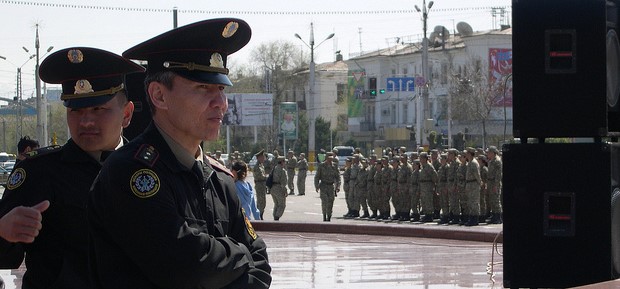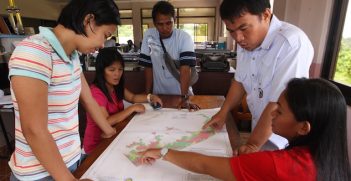Security Challenge in Kazakhstan

A fatal attack in Kazakhstan this week highlights the threat of terror across Central Asia. Like its neighbours, if the Kazakh government cannot keep its citizens safe, it risks losing its credibility.
Suspected militants killed six people in Kazakhstan on Sunday 5 June, including three members of the armed forces. The deaths came after the group robbed a gun shop and attacked an army compound in the northern city of Aktobe. A spokesperson from the Kazakh interior ministry identified the perpetrators as “followers of radical, non-traditional religious movements”, a government shorthand usually used to refer to Islamic extremists. Eleven of the militants were allegedly killed in a shootout with police, with seven more arrested and detained. The attacks took place on the eve of Ramadan, the holiest month in the Islamic calendar, striking a city that has experienced very similar attacks before. How can this latest incident be viewed appropriately in the context of extremist violence in Central Asia and specifically in Kazakhstan?
Central Asia is no stranger to religious extremism, although government responses to it have differed. Tajikistan spent most of the 1990s engulfed in a civil war between a fragile authoritarian state and an assortment of Islamic militant factions, some of which were supported by al-Qaeda over the porous border with Afghanistan. Uzbekistan has brutally repressed opposition of any kind, often invoking the threat of terrorism to justify the existence of a powerful domestic security service. Both countries, along with Kyrgyzstan, must manage the ethnic, resource and religious rivalries that once made the Fergana Valley—a region the three countries share—a hotbed of extremist recruitment. Kazakhstan, by contrast, has experienced comparatively minor incidents of domestic terrorism but there is a clear pattern at play.
Terrorism in Kazakhstan
Kazakh authorities were initially reluctant to acknowledge the threat of domestic terrorism. In May 2011, the government identified Rakhimzan Makatov as being responsible for a suicide bombing in Aktobe, the first attack of its kind in Kazakhstan. According to investigators, Makhatov was a gangster who killed himself to avoid responsibility for his crime; they failed to explain why he chose to attach an explosive device to himself and detonate it inside the office of the security services, the KNB. Two police officers were murdered in a village south of Aktobe in June 2011, where one of the assailants detonated a suicide vest shortly afterward. This was again blamed on criminals using religion as a cover. One would-be militant accidentally set off his suicide vest in the western city of Atyrau in October 2011. Just one month later, a man in the southern city of Taraz killed two people at a gun shop before killing five police officers and blowing himself up.
This latest attack in Aktobe, then, follows a clear pattern: individuals or small groups of young men using vehicles to commit armed robbery and targeting Kazakh authorities directly, before taking their own lives or fighting to the death. The more severe terrorist attacks in Kazakhstan have largely focused on Aktobe and Atyrau, both of which are industrial cities and centres of the lucrative oil and gas industries that have powered Kazakhstan’s economic growth since independence in 1991. They are also, however, powerful examples of inequality in a country that has experienced multiple currency devaluations and revenue losses due to falling oil prices. Further delays in the progress of economic reform—diversification away from the resource economy, job creation and distribution of wealth—risks further alienating younger Kazakhs from the state, particular those outside Astana and Almaty.
Islamic State and Central Asia
A potential cause for concern is that this is the first attack in Kazakhstan since the rise of Islamic State (IS) in Iraq and Syria. Several hundred Kazakh nationals are believed to have travelled to IS-controlled territories, including young children, and a sophisticated propaganda video released in late 2014 shows the youngsters reciting the Qur’an and undergoing weapons training.
However despite this, and despite the attack in Aktobe on Sunday, the threat posed by IS fighters in Kazakhstan should not be overstated. First, exact figures for the number of Central Asians training and fighting alongside IS are very difficult to come by because authoritarian regimes tend to use violent extremism as an excuse to suppress domestic opposition. While the region contributes the third-largest contingent of foreign fighters, the exact makeup of this contingent is difficult to verify. Secondly, IS has changed its propaganda tactics to invite Kazakh nationals and other Central Asians to live under IS rule, rather than to wage war on their own governments. This latest attack seems to fit better with earlier approaches rather than IS-inspired tactics. Finally, the major player in regional extremist violence has traditionally been Hizb-ut-Tahir, a home-grown network of radicalised young men with strong ties to communities in the Fergana Valley; IS poses a threat mostly as a source of inspiration rather than funding or training.
Any attack on home soil, particularly by radicalised locals rather than foreign fighters, is concerning for Kazakhstan. It has been suggested before that many Kazakhs regard civil liberties as a fair price to pay in exchange for the security offered under the authoritarian rule of President Nursultan Nazarbayev; if the government cannot be seen to provide this security, it will lose credibility. Policing and intelligence activities will necessarily drive part of the solution, but another more long-term part will be found in continued economic initiatives that offer greater equality along with employment security beyond the national dependency on resource wealth. Kazakhstan must resist the temptation to resort to the same act as its neighbours—blaming gangsters or detaining suspects without evidence or trial—and instead continue on the challenging road to reform.
Luke J Dawes completed a Bachelor of Languages and a Bachelor of Arts (Hons) specialising in Asian languages and political violence in Indonesia. He works full-time as an analyst in the finance sector. This article is published under a Creative Commons Licence and may be republished with attribution.





